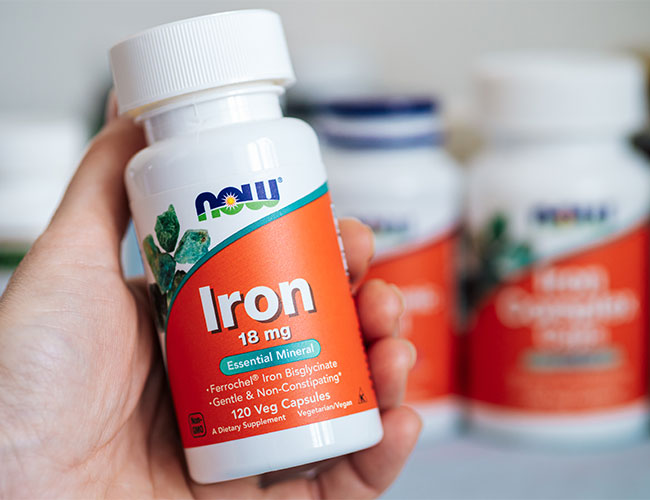
Iron
The first supplement Bohnengel recommends to prevent hair loss is iron. Our body needs iron to transport oxygen to different areas. If we're low in this mineral, we can experience many adverse effects—including hair loss. This comes from a lack of oxygen being transported to our hair follicles, which are necessary for their growth.
"Iron carries oxygen to the cells, including the cells that stimulate hair growth," Bohnengel explains. "Without enough iron, hair can't grow."
Additionally, ferritin is the storage form of iron. Bohnengel notes that if we don't have enough of this, our hair follicles can be weakened. For this reason, supplementing with iron can be a great way to ensure those hair follicles stay healthy enough to grow long and thick strands.
Of course, while supplementing is a great option if you don't get enough iron in your diet naturally, there are many foods that contain high amounts of this mineral. In fact, Bohnengel encourages people to get their iron straight from their food. "Getting nutrients from food is the ideal route for optimal absorption of nutrients," she says.
So, what's the best way to do this? Bohnengel recommends some seafood. "After liver, oysters and clams are actually the best source of both iron and zinc," she says, pointing out that zinc is another great nutrient for hair growth. "One serving of oysters has more iron than 3 ounces of steak!" Woah!
Bohnengal also points out that while certain plant-based foods like spinach and beans do have some iron, it's harder to absorb the mineral when it comes from these foods. "It's much more efficient to get iron from meat, poultry, or fish," she says. Got it!
Finally, Bohnengal warns readers not to go overboard on this supplement, because, although deficiencies are more common, getting too much iron can also lead to hair loss. "Since excess iron also causes hair loss, it's important to test iron status before supplementing with iron," she warns. But you can eat as many oysters as you want—you likely won't run into an overload from food alone. "Iron overload is almost always the result of iron supplementation, so getting your iron from food is not a concern," Bohnengal concludes.
Vitamin D
If you don't get enough sun, it turns out that may be one more cause of hair loss. Bohnengal says vitamin D deficiencies are another major culprit of these issues—and many Americans suffer from the lack of this vitamin.
"Vitamin D is made in the skin when exposed to sunlight, but with our indoor lifestyles and sunscreen application, vitamin D deficiency in the U.S. is widespread," she explains. For this reason, taking a daily vitamin D supplement can be one great way to prevent hair loss.
If you want to get vitamin D naturally through food, you have a lot of great options to choose from. "Food sources of vitamin D include salmon, fortified dairy products and some mushrooms grown under UV lights," Bohnengal lists.
However, the best way to ensure you're taking in enough of this vitamin is typically through a supplement. "It's challenging to get enough vitamin D from food alone, so supplementing is often helpful," she says. Noted!


